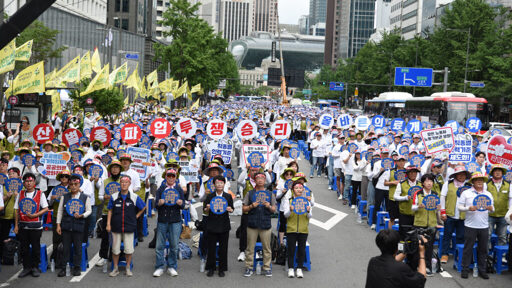Healthcare workers across South Korea are pressing ahead with industrial action, demanding sustainable workforce policies and warning of an untenable situation that has worsened since the onset of the COVID-19 pandemic and physician protests. The Korean Health and Medical Workers’ Union (KHMU) announced an industry-wide strike and additional actions for July 24-25 to highlight the challenges faced by workers in the sector.
Numerous KHMU chapters reported active participation in strikes and related demonstrations, fueled by increasing frustration among members. “Once hailed as heroes during the COVID-19 crisis, healthcare workers remained committed to their duties amid last year’s healthcare system turmoil, only to be scapegoated in ongoing doctor-government conflicts,” the union stated in mid-July.
Following mass resignations by trainee doctors over plans to increase training quotas, seen by many in the sector as a prioritization of their professional status over possible benefits for patients, other healthcare staff reported increased workloads and mounting stress. A KHMU survey conducted earlier this year found that nearly 90% of nurses felt the impact of the doctor shortage, citing a shift of medical responsibilities onto themselves.
“Due to issues such as delayed or missing communication with attending physicians, nurses and other support staff are frequently placed in inappropriate situations where they are compelled to perform duties that rightfully belong to doctors,” KHMU warned. These duties included issuing prescriptions, conducting procedures, and dressing wounds – tasks for which many workers had not received additional training. As a result, nearly one-third reported fearing that such practices could compromise patient safety or result in accidents.
Adding to these concerns are high rates of verbal and physical abuse in the workplace, along with excessive expectations placed on staff amid ongoing shortages. The KHMU noted that in 2024, 79% of pregnant workers felt unable to request lighter duties, illustrating that work-life balance policies remain largely wishful thinking. Many members indicated that expanding such protections, like access to parental leave or the option of a four-day workweek, would significantly improve their quality of life and sense of security. A more comprehensive, public healthcare-oriented staffing policy is a key element in achieving all of that, according to KHMU’s analysis.
In its public demands, the KHMU is calling on the government to address both immediate grievances and systemic issues raised over the years. At a July 2 rally, union leaders reiterated their call for stronger public health infrastructure, urging the implementation of existing labor agreements, an expansion of medical school quotas, and the introduction of regional doctor posts and staffing policies.
People’s Health Dispatch is a fortnightly bulletin published by the People’s Health Movement and Peoples Dispatch*. For more articles and to subscribe to People’s Health Dispatch, click* here.
The post South Korea health workers demand sustainable staffing policies appeared first on Peoples Dispatch.
From Peoples Dispatch via this RSS feed


